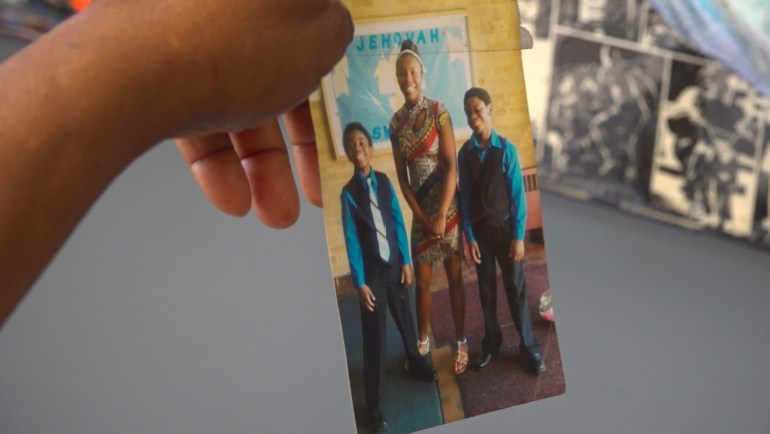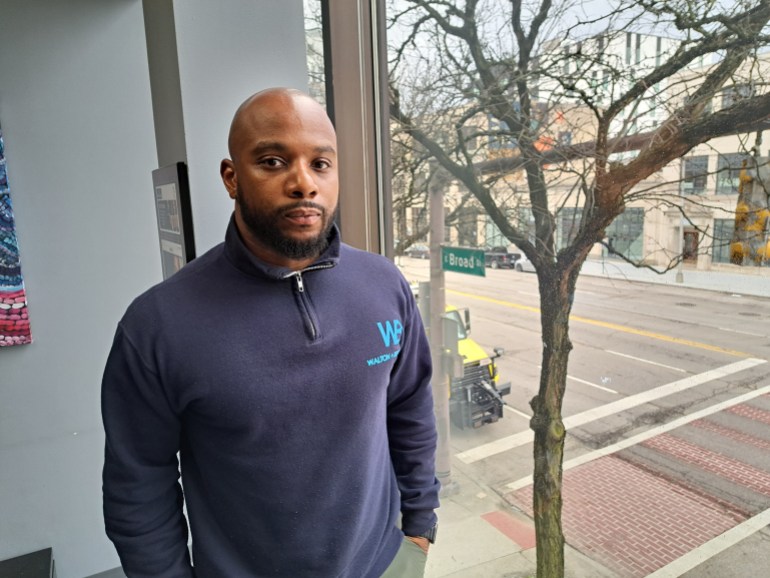Columbus, Ohio – Some of the final moments of Ta’Kiya Young’s life unfolded in a supermarket car park last August.
Suspected of stealing from a Kroger’s grocery store in Blendon Township, Ohio, Young had just climbed into her black Lexus sedan when two police officers approached her.
“Are you going to shoot me?” Young asked as the officers ordered her out of the car, one with his weapon drawn.
Her car started to roll slowly forward. The armed officer fired. His bullet pierced the car’s windscreen, and the body camera he wore captured a final, high-pitched scream.
Young, only 21, later died in a nearby hospital. So too did her unborn daughter: Young was entering the final trimester of her pregnancy at the time of her death. She left behind two sons, ages six and three.
It was a bitter loss for Nadine Young, her grandmother. “She was a fun-loving person,” Nadine said. “Always cheery.”
But Nadine’s anguish was compounded when she discovered that officials considered there to be three possible victims in the deadly incident: Young plus the two cops.
That allowed the officer who fired the fatal shot to invoke a state measure called Marsy’s Law, designed to conceal the identities of crime victims.
Criminal justice advocates, however, warn this is part of a dangerous trend in the United States, where police officers use Marsy’s Law to shield themselves from public scrutiny.
“They were saying he was a victim?” Nadine asked incredulously. “He was the man with the gun.”

A shield against accountability?
Marsy’s Law originated in California in 2008. Framed as a victims’ bill of rights, it sought to protect crime victims not only by ensuring their privacy but also by notifying them if their assailants were up for parole.
Since then, variations of the law have been passed in about a dozen other states, including Ohio.
But experts fear Marsy’s Law has been co-opted by police departments in those states to hide the identities of officers involved in use-of-force incidents.
In Union County, South Dakota, for instance, a highway patrol trooper shot a man twice following an altercation in September 2018. His identity was withheld under Marsy’s Law.
In Oshkosh, Wisconsin, another officer used Marsy’s Law to avoid being named after he fired upon a man who was armed and drunk last June.
The law enforcement officers in both cases were said to be threatened or physically harmed, thereby making them crime victims.

Supporters of the law’s use in law enforcement argue that police officers regularly face violent criminals, and the potential for victimisation is high. Their names should therefore remain private if they so wish.
However, academics and rights groups have described the ability to hide officers’ identities as a “gift to bad cops”.
The anonymity, they say, could translate into a lack of accountability — which in turn could lead to officers with a record of excessive force returning to the streets, endangering more lives.
And the risk is on the rise. The nonprofit group Mapping Police Violence named 2023 the deadliest year in a decade. An estimated 1,243 people were killed by law enforcement last year, the nonprofit’s highest tally on record.
Walter Olson, a senior fellow at the Cato Institute, a Washington, DC-based think tank, believes scrutinising law enforcement’s use of force is a critical public right.
It can also help reduce the rates of police violence, he said. “[It’s] one of the key ways in which we prevent the next incidents of abuse from happening.”

On shaky legal ground
But Marsy’s Law is raising broader legal questions, not only about abuse of power in law enforcement but also about due process.
Critics see the law as preventing potential litigants from accessing information that might be relevant in their court cases. Then there’s the question of how to decide who is a victim.
“People are being accorded these crime-victim rights even though there has been no legal process determining whether they have been victimised. That’s a paradox,” said Olson.
“It can go beyond their name not being released. It could be that they don’t have to reveal information to an opposing lawyer.”
Those concerns have led to high-profile legal challenges and even protests. In Florida, for instance, Marsy’s Law has come under increasing public scrutiny.
A 2020 investigation from USA Today and ProPublica found that, in at least half of the cases where Florida officers invoked the law, no physical injuries occurred.
That same year, two fatal police shootings in the state capital Tallahassee prompted law enforcement to invoke Marsy’s Law.
One of the shooting victims, Tony McDade, was a transgender Black man. His death came only days after George Floyd, an unarmed Black man, was killed at the hands of police in Minnesota, prompting nationwide uproar and months of demonstrations.
Protesters in Tallahassee likewise filled the streets, chanting McDade’s name and comparing him to Floyd. The pressure prompted the city to push for the release of the officers’ names, against the wishes of the state’s own police union. That escalated into a lawsuit.
Last November, Florida’s Supreme Court ultimately ruled, six to zero, that Marsy’s Law “does not explicitly” shield the officers’ identities — nor the identities of any other victims.
It was a victory for proponents of government transparency and a rebuke to law enforcement’s embrace of the statute.

A family grappling with loss
Other lawsuits are under way, including in Ohio, where Young was killed.
For instance, the Columbus Dispatch, a newspaper in the state capital, filed a complaint in Ohio’s Supreme Court arguing that police were using Marsy’s Law to block public records requests.
Al Jazeera attempted to reach the Ohio branch of the Marsy’s Law advocacy group for comment but received no response. It also reached out to the Blendon Township police chief, but likewise did not receive a response.
The officer who shot and killed Young and her unborn child was placed on paid administrative leave, as is common practice after police shootings.
In January, the case was sent to a grand jury to decide whether the officer would face charges. A county prosecutor also publicly identified the officer as Connor Grubb, after months of officials concealing his name.
The legal team representing the Young family, however, had named Grubb in their public announcements shortly after the loss of the 21-year-old and her unborn child.
They point out that the police department’s own policies required Grubb to get out of the way of Young’s slow-moving vehicle, rather than using lethal force.
“This shows why we need police accountability,” said Sean Walton, the lawyer representing Young’s family.
“Police departments are going to use [Marsy’s Law] until they are no longer able to use it.”
Walton has also filed an action with the Ohio Supreme Court seeking to prevent law enforcement officers from concealing their identities in use-of-force interactions going forward.
Six months on from the killing, Nadine Young is now caring for her granddaughter’s two sons. She told Al Jazeera they all are still grappling with their mother’s death.
“One of them tells me he wants to be a police officer — but a good police officer,” she said. “We just miss her a lot. We want justice for her.”
Read More: World News | Entertainment News | Celeb News
Aljazera








